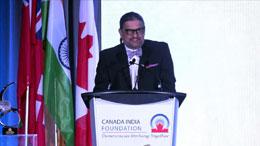Indo-Canadians vow to fight Khalistani movement

Members of the overseas Indian community in Canada are attempting to counter the political campaign by separatist elements espousing the pro-Khalistan viewpoint and prevent Canadian politicians from adopting these views.
The effort, both at the federal and provincial levels, marks the first time that the broader Indian community is trying to make its presence felt in the nation’s politics.
This initiative has been precipitated by a number of developments in recent months, including the passage of a resolution in the Ontario Assembly this April, which termed the 1984 anti-Sikh riots in India a ‘genocide’. With elections in the Ontario due next year, the initiative will provide an opportunity to try and counter politicians and parties who have fostered the Khalistani narrative.
Ajit Someshwar, one of the prominent figures behind this effort, said, “We are going to, during the provincial elections, single out those active anti-India campaigners and support their opponents regardless of party,” referring to the Ontario elections.
Someshwar, who is also the chair of the Canada India Foundation (CIF), said, “We have decided, at least for the short term, not to promote politicians who are active in this effort to pass the genocide provincially and also their backers federally.”
A spate of measures in this regard, include funding for candidates who do not support separatists and withdrawing funds from those that do, has been planned. The preferred candidates, regardless of political party, may also be assisted in other ways, including help with staffing campaigns.
The people backing these efforts claimed that they are working on a volunteer basis, and neither the Indian government or its official representatives are involved. Also on the agenda is informing the Indian community about these issues, which may include a mail blitz aimed at the nearly 20,000 voters of Indian origin.
This is the first time such an endeavour is being witnessed in Canada, as the Indian community attempts to broaden the base of participation in politics in the country, which has often been held hostage to an extremist fringe.
As Someshwar said, “It is not our role to get behind any one party. Our role is to create the right kind of environment for good public policy advocacy, that leads to the betterment of India and Canada relations. In that role, we will be supporting and encouraging more young people from our community to come forward and engage in the political process. For sure, we will be encouraging that with money and we will be encouraging that with access.”
In 2012, The Indian government issued a pointed and public warning to then Prime Minister Stephen Harper to mind what they see as alarming evidence of Sikh extremism on Canadian soil.
The issue of internal extremism has been one that has shaken India to the core over the past several decades — former prime minister Indira Gandhi was murdered by her own Sikh bodyguards after a string of events sparked by fundamentalists seeking their own separate, fundamentalist nation they would call Khalistan.
Canada too has been rocked by related terrorism. Police believe the bombing of a 1985 Air India flight that killed 331 people was orchestrated by Sikh extremists based in Canada.
Pockets of pro-Khalistan support are still visible in the Indo-Canadian community, after years of dormancy.
Last month, the Canadian government told India that there is no threat to Punjab chief minister Amarinder Singh and has concluded its investigation into the matter.
In a communication to the Indian authorities, Canada’s department of foreign affairs, trade and development has stated that the investigation had been conducted by the Royal Canadian Mounted Police (RCMP).
Sources in the ministry of external affairs (MEA) in New Delhi told IANS that Canadian authorities, in the communication, has said that the RCMP investigation has determined that there is no evidence of direct physical threat made towards Amarinder Singh.
It further stated that there was “not sufficient evidence” to file criminal charges or proceed against anyone. The Canadian government said that in view of the findings, the investigation had been concluded.
The Indian high commission in Canada had lodged a “formal complaint” to Global Affairs-Canada (Canada’s foreign office) in April following a threat publicly issued to the Punjab chief minister by pro-Khalistan elements during a Vaisakhi Day event in British Columbia’s Surrey city.
The threat was part of the hate speeches made by Sikh radicals operating out of Canada. Videos of the Vaisakhi Parade in Surrey on April 22 were sent to the Canadian foreign ministry as proof.
Indian authorities had also objected to the public display of Khalistan floats with images of slain separatist leader Jarnail Singh Bhindranwale and other terrorists, pictures of AK-47s and photographs of former and serving army and police officers who are on the hit-list of Sikh radicals.
The Amarinder Singh government had, in April, cold-shouldered visiting Canadian defence minister of Indian-origin Harjit Singh Sajjan as he travelled to various places in Punjab.
He had refused to meet Sajjan, the first Sikh to be the defence minister of a Western country, accusing him and other ministers of Punjab origin in the government of Canadian Prime Minister Justin Trudeau of links to radical elements demanding a separate Sikh state of Khalistan.









